Bahrain: Warehousing Space Increases in Industrial and Logistics Zones
Amin A. Al Arrayed, General Manager of First Bahrain
Today it’s very stable, so we are talking about maybe 2 or 3% growth which is very slow compared to where we were. The economy has slowed, that’s for sure.
Interview with Amin A. Al Arrayed, General Manager of First Bahrain
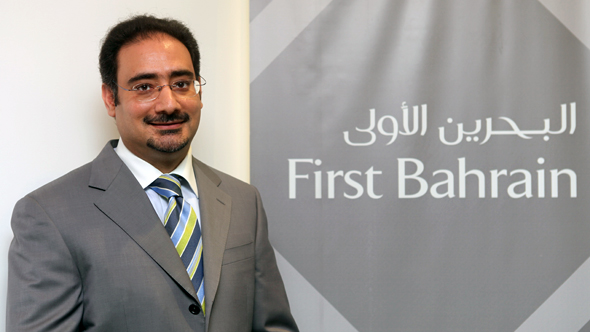
Bahrain had positioned itself as a transportation and logistics hub to serve not only the largest economy in the region which is Saudi Arabia but also to serve the Northern Gulf but there are other emerging locations such as Dammam who is working on their own concept. Basra, in Iraq is also developing its own capacities. So can Bahrain, be competitive in this huge large-scale market?
You’ve seen a lot of money being spent on infrastructure so we have the new Khalifa Bin Salman Port which went live recently. We also have the surrounding infrastructure which has been zoned as industrial.
I think it can. You’ve seen a lot of money being spent on infrastructure so we have the new Khalifa Bin Salman Port which went live recently. We also have the surrounding infrastructure which has been zoned as industrial. The area where we’ve invested is called the B.I.W. – the Bahrain Investment Wharf – which takes a lot of the risk out of development because the infrastructure, such as the roads, electricity, and the water network, is all provided for. So for an investor, it’s very easy to set up without the risks associated with the infrastructure.
There’s now a causeway that takes you all the way to Saudi Arabia, there’s a new bridge that takes you directly from the new industrial area called Salman Industrial City all the way to Saudi Arabia. The area’s also located within 10 minutes from the Bahrain International Airport. So strategically speaking, I think that the new Industrial City for Bahrain is very competitive.
You have to also take into account the fact that the Bahrain economy has probably one of the best-regulated systems within the GCC and the broadest middle class. So as far as the labor force is concerned, it has an advantage over the other countries. The regulatory framework, the legal framework which is international level – all of these things help make Bahrain attractive, relatively speaking, as a good place to hub your GCC network out of. So despite the challenges we’ve had, despite the unrest that we’ve had, we still have a competitive advantage as far as being the next transport and industry hub.
First we experienced the global economic crisis which hit Bahrain as a major financial center. We saw the declining part of the financial industry and later on we saw the turmoil – the events that happened in Bahrain in 2011. 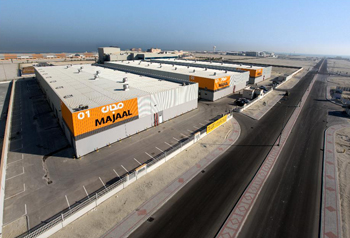
I would agree that it’s been a very difficult time over the last two years with the financial crisis followed by the political unrest. Small to medium sized companies in Bahrain were, I think, the ones that were impacted initially in a very big way simply because they are very sensitive to cash flows. You also had the hospitality and luxury high-end sectors impacted significantly. Investor confidence reduced. So all of these created many challenges for investors, retail operators and the hospitality sector, and it continues to be a challenge. There’s no doubt there has been negative impact as a result of the financial crisis and the political unrest. This was the short-term impact. Now it’s been almost two years so I can say it’s been medium-term. But long-term, there’s still a lot of confidence and a resolution to the issues that are outstanding.
I think you also have a general hardening of doing business in Bahrain. One thing that happens when you have stresses in an economy is that companies are forced to become more resilient, cost-sensitive and effective in producing products. So a lot of companies that are able to withstand this period are now better geared for the future because they’ve got their house in order, so to speak. I think that’s one of the things, if I look back at the boom days, which was prior to the financial crisis, you actually had a lot of excess and a lot of waste, a lot of inflation and a lot of inefficiencies. It got to the point where that was no longer sustainable and that’s why the crisis happened. I think that companies that are actually able to survive this period and re-invent themselves as more efficient companies will be in a better position in the long-term to take advantage of growth when it comes, and it will come.
What do you think about the events themselves? Not many people are convinced there will be a successful end. Many actually think the events will be lingering on for a long time. What is your take on the issue?
I think politics has always been in the background, so it’s not something new. It’s come to the foreground now and it’s something that’s being discussed and I think that’s healthy. To have political issues discussed publicly, to have the right kinds of reform instigated, and improving people’s lives and accountability and things like that, I think that’s all positive steps. It can be painful. It can be difficult for some to make the adjustments. I think that the economy in general always finds a way. I’m not a pessimist at all in terms of the outlook. I think that the strength of the recovery is uncertain. I don’t think that anyone has the answers of when things will be resolved fully and if they can be resolved fully but definitely I can see a view that things will get better and not worse.
So I’m typically optimistic in our ability going forward. I think that political debate is healthy and I think that just as I said before, the economic companies become more resilient when they’re stressed. I think even citizenship and the idea of being a citizen and what that entails, of being a civil servant and what that means, has also been tested during this period. In the end, if you look at the history of the world, nothing comes out of a very easy period. You always have these struggles and these periods where the outcome of stress usually is positive because it creates a more active citizenry and a more active participation in the political process. I think that in the long-term should be to the benefit of everyone.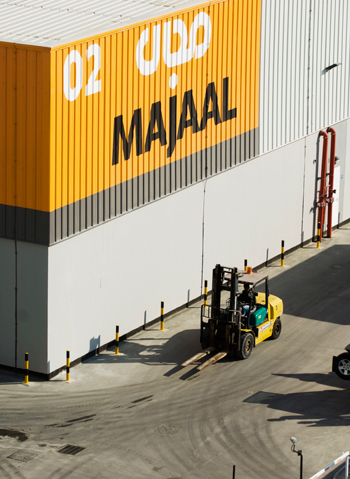
Let’s look more closely at the warehousing capacity in Bahrain. There have been new projects. Some people saw your success and have been increasing their capacity. An example is Tahzeen which added warehousing capacity, also Agility added capacity. There are many others in competition including Bahrain Logistics Zone so do you see rising competition? Is the capacity there?
It’s very natural that if you do well or if a sector is doing well, that will attract competitors to the market. We have the advantage of being almost the first mover for SME warehousing. We’re benefitting from the fact that we moved first and we took that first step. Again, I think that as far as competition goes, it makes us as a company more vigilant. It makes us focus on how we can differentiate ourselves and how we can have a better value proposition. So I see it as a natural, healthy stressor for us. I don’t think that anyone should shy away from competition. If you notice in our projects, we phase our projects. We have phase 1 and phase 2, and in each phase we try to add in new elements that help keep us ahead of the curve. So we don’t have a problem with competition. We see that as a natural byproduct of being successful.
Can you give us the outlook in terms of general warehousing capacity?
I think that we found very early when we launched with our project that there was a gap in the market with regard to small to medium sized spaces. So if you were a big company and you were looking for big space, typically you would build your own warehouse because you had the resources. The smaller to medium sized companies in Bahrain had to make do with what was available and usually it was a very large space so they would have to take a very big space but very low quality. What we said we would start to introduce into the market was small spaces of high quality. So our spaces are actually the same high quality as the big spaces that are being developed by the big companies but we offer them to the small companies. So they are very divisible spaces; we can go as small as 250 metres.
I think that we found very early when we launched with our project that there was a gap in the market with regard to small to medium sized spaces.
So when we launched our project, it was very gratifying to see we had been right and we started to attract this segment that was companies that wanted small space but very high quality space. They weren’t willing to pay for a big space that was poor quality. Location is also very strategic and we benefitted from this. I think there is still very huge demand and we are expanding our project. So we will actually be offering another 12,000 square metres into the market by the summer. We feel very confident that the demand for small, high quality space is very strong. It’s not about warehousing in general; it’s about which part of that warehousing you’re going to take. For us, our focus has never changed. It’s always been small, high quality space which is very flexible with value-added services.
Is certification with TAPA (Transport Assets Protection Association) something you plan for?
Not really, no.
You mentioned that the SMEs were really affected by the crisis. How is it that you didn’t have any problems filling your space?
I have to qualify this. The SMEs represent close to 90% of the private sector economy in Bahrain. So when you talk about the private sector, you’re typically talking about small to medium sized companies in terms of volume. There’s typically the government-owned companies, the big players like Bapco or Alba and then you have this huge sector which is all small to medium sized companies. So it’s a very large sector; it’s not a small sector at all. This is different than startup businesses. Startup businesses are a different concept so let’s not confuse the two.
Small to medium sized companies can mean anything from a company that employs up to 200 people to a very small company that employs maybe five or ten people with a very small turnover. So it’s a very broad sector. I think that the appeal of our project is that we appeal to so many different companies. If you look at our tenant base and you look at the types of companies that have actually taken our space, you’ll see that it’s very diverse. We have within our spaces financial companies that are using us for documentation storage and disaster recovery. We have media publishing houses that are using us as a print house. We have actual industrial manufacturing, such as a water filter company, pumps manufacturer and a manufacturer of blinds and covers. You have pharmaceutical companies for medicines. So what we’ve done is we’ve appealed to the broad cross-section of the economy which puts us in a very strong position because anybody can make use of our space. It’s a very flexible, dynamic space.
If I go back to your question, the private sector is where the pain has been felt the most, simply because it’s just the majority of the companies. The private sector is one where they’re very sensitive to cash flows and very sensitive to growth in the economy so for a private sector company that’s profit-orientated and doesn’t have a fall back, that has to actually be able to generate income and collect from the market the cash flows to be able to pay its employees, to pay the rent. In positioning ourselves, we are a very good barometer for how the economy is doing. It hasn’t been easy for our tenants. Even in terms of our price structure, we’ve had to show more flexibility during the crisis than before the crisis. The trajectory the economy was on previously would have taken us to a much different level than we are today but we are still able to make things work through our strategy.
Are these companies mostly Bahraini?
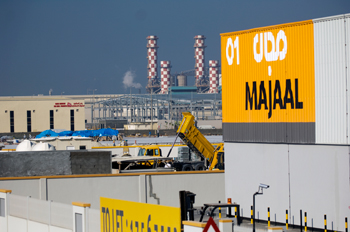
It’s a mix. Initially we thought it would be mostly Bahrain-incorporated companies but we started to find actually that a lot of foreign companies wanted to set up in Bahrain and found us a very attractive place to set up. And simply because we took away the need for them to make a capital expenditure in developing their own facilities. So we work very closely with the Economic Development Board in bringing in FDI. In fact they’ve come to our offices a number of times with clients who are prospective investors in Bahrain and we’ve taken some of those on board in our facilities. It’s a very simple proposition for a foreign company. If they see that the facility is up and ready, meets their specifications, and is ready on day one so they don’t have to spend time and money setting up their facility, that’s a huge benefit.
Talking about foreign companies, I was recently reading the report by EDB that said that there is a growing appetite for Bahrain among foreign companies but it’s still not at the pre-crisis. There is a lot of negative reputation. What is your take on this?
I would agree with that. FDI is very sensitive to the kind of uncertainty that exists today. FDI typically wants to feel safe and that’s the challenge. Today, with the media reports that come out, with a very public situation of unrest, if you do research and feel there may be risk associated with your investment, then you probably think twice before investing. So clearly that makes the EDB’s job more difficult because they have to really work hard to convince companies to invest. The level of scrutiny has become much higher. The flip side to that of course is the costs have come down considerably. The costs of setting up in Bahrain today are much cheaper than they were pre-crisis simply because there was a lot of inflation. Bahrain can probably provide a lot of value in terms of cost structure but it still has to overcome this initial feeling of risk associated with Bahrain which is a negative consequence of the crisis.
Are the fundamentals the same?
I think so. If you look at the situation and we’ve been active for many years now after the crisis – almost two years – there is very little security risk. There is very little actual risk. There are issues you may hear about or delays because of the roads here or there or protests here or there, but I don’t think there’s major disruption to businesses. A lot of it is perception as a result of what’s in the media, and as a result of this very broad discussion that sometimes takes place on the streets as opposed to in parliament where it should be taking place. So that kind of perception has negative consequences.
Can you quantify economic consequences of the events?
I can’t give you a percentage decline or anything like that. I don’t have that kind of statistics. I can tell you that if you look at the GDP growth pre-crisis, we were talking close to 5% growth. Today it’s very stable, so we are talking about maybe 2 or 3% growth which is very slow compared to where we were. The economy has slowed, that’s for sure. The real question is in terms of consequences, how many businesses have decided that it’s no longer worth continuing their operations and that’s a more permanent damage that happens, if companies start to say we’ve been here but I think it’s time for us to leave. For me, that’s more concerning. Thankfully I don’t think that’s happened en masse. You’ve had companies that have made that decision but they were probably more based on the economics than on the political side of things. You’ve got areas where growth is much stronger like Dubai and Qatar that for a lot of companies that only want to have one base in the Gulf, maybe would consider those areas. That’s unfortunate that Bahrain has maybe lost that competitive advantage to these other countries.
There are very few players that actually left Bahrain in the financial industry.
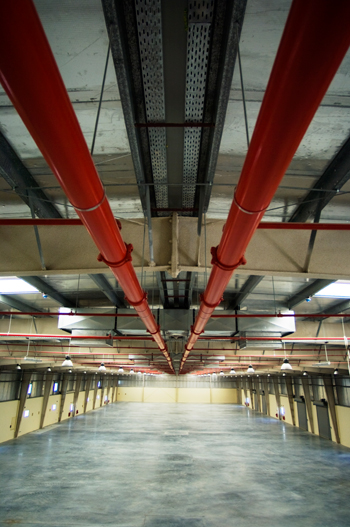
I think there’s been a lot of resilience and I mentioned this previously, that there’s a lot going for Bahrain and you have to understand that it’s not a situation where what is perceived when you’re looking at the media reports from outside is the same as what you feel when you’re actually within the country. I think that the companies that are actually established and can see the day-to-day, yes they can see differences but they don’t feel as paranoid as some of the companies that maybe are thinking of investing and taking a view of the country based on media reports. I think there has been a lot of resilience, especially in the financial sector. In fact, a lot of the damage or a lot of the companies that are experiencing difficulties has nothing to do with the political crisis. It’s actually due to the financial crisis and the fact that they were over-leveraged and they are facing restructuring. That was primarily the Islamic banking sector and the investment sector specifically. So you do have stress within some of the banks but in my view, it’s not really related to the political situation at all.
First Bahrain is an investment real estate company. What are the plans? What is the outlook? You are still only with Majaal?
I think as far as the short term, our focus will remain on Majaal. Simply, Majaal is in a very defensive sector and in an environment where there’s uncertainty, we feel more comfortable growing Majaal simply because it is a very defensive sector. So in industrial facilities and the industrial sector, I think there is room for further growth. Even though we do have lands in Seef and Janabiyah, which are more traditional investment, commercial properties, I think we still are waiting to see the right signs from the economy and that there will be growth and recovery in those sectors before we start to invest in a heavy way.
You mentioned industries is a good sector but there are significant challenges, for example the cost of energy and the fact that government is sort of getting into debt and they are thinking of dropping subsidies.
As far as industry goes, I am very optimistic and it’s not simply an issue of energy prices. It’s the fact that the government has invested so much in infrastructure to support that sector. For an investor who’s looking to make an investment, it’s very important that you align yourself with government spending and especially in the Gulf where the government usually is the driver of the economy.
I can tell you this from personal experience being involved in Majaal. The level of support we’ve received from the government has been very strong. They provided us with very quick turnaround on applications, on approvals, anything that we might need to start our project. The infrastructure is first-rate; the roads came in on time as they were supposed to. The electricity was provided. So all of these factors make it very easy for us to make the decision to continue investment within that sector. I think where the difficulty comes is when we start to enter new territory where the government really isn’t focused and I think that’s more challenging. Until we start to see more attention given to areas like hospitality and retail to ensure the success of those projects, we’ll always be a little bit cautious.